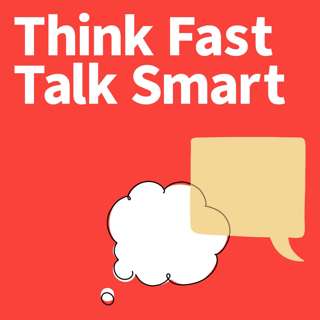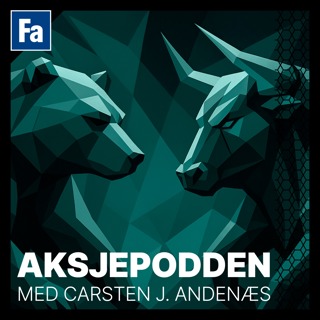
64. Rethinks: Techniques for Managing Your Reputation
How others perceive us in person and via social media can impact our careers and social standing. But we can build the reputation we want through conscious communication.On this episode, strategic communication lecturers Matt Abrahams and Allison Kluger share techniques on effectively improving and managing your reputation.Connect:Premium Signup >>>> Think Fast Talk Smart PremiumEmail Questions & Feedback >>> hello@fastersmarter.ioEpisode Transcripts >>> Think Fast Talk Smart WebsiteNewsletter Signup + English Language Learning >>> FasterSmarter.ioThink Fast Talk Smart >>> LinkedIn, Instagram, YouTubeMatt Abrahams >>> LinkedInShow Notes:Allison Kluger“How Tylenol Made a Comeback” NYTimesAllison Kluger: "Telling your Story Can Lead to Success and Opportunity"Allison Kluger: Last Lecture Series: “If Not You, Then Who” ********Thank you to our sponsors. These partnerships support the ongoing production of the podcast, allowing us to bring it to you at no cost. This episode is brought to you by Babbel. Think Fast Talk Smart listeners can get started on your language learning journey today- visit Babbel.com/Thinkfast and get up to 55% off your Babbel subscription.Join our Think Fast Talk Smart Learning Community and become the communicator you want to be.
2 Aug 202221min

63. Cheap Talk: What Economics Has to Say About Communication
Your words — are they credible? Or are they what Paul Oyer calls “cheap talk?”According to professor of economics Paul Oyer, how our words align with our actions isn’t just a matter of communication, but a matter of economics too. Economic concepts hold in all areas of life, which Oyer’s research has explored in everything from Uber driving to online dating.“Economics is everywhere,” Oyer says. “It's an incredibly powerful lens to analyze almost anything in the real world.”Join Matt Abrahams, lecturer in strategic communication, as he sits down with experts from across campus to discuss public speaking anxiety, speaking off the cuff, nailing a Q&A, and more. Connect:Premium Signup >>>> Think Fast Talk Smart PremiumEmail Questions & Feedback >>> hello@fastersmarter.ioEpisode Transcripts >>> Think Fast Talk Smart WebsiteNewsletter Signup + English Language Learning >>> FasterSmarter.ioThink Fast Talk Smart >>> LinkedIn, Instagram, YouTubeMatt Abrahams >>> LinkedIn ********Thank you to our sponsors. These partnerships support the ongoing production of the podcast, allowing us to bring it to you at no cost. This episode is brought to you by Babbel. Think Fast Talk Smart listeners can get started on your language learning journey today- visit Babbel.com/Thinkfast and get up to 55% off your Babbel subscription.Join our Think Fast Talk Smart Learning Community and become the communicator you want to be.
18 Jul 202220min

62. Rethinks: Summer Learning Series, How Humor Can Be a Secret Weapon in Communication
In the kickoff to our Summer Learning Series, we're revisiting one of our favorite episodes. This interview features Stanford GSB faculty members Jennifer Aaker and Naomi Bagdonas and gives specific insights into how humor can transform your communication at home and at work. At the time of this episode, their book Humor, Seriously was just set to launch.Connect:Premium Signup >>>> Think Fast Talk Smart PremiumEmail Questions & Feedback >>> hello@fastersmarter.ioEpisode Transcripts >>> Think Fast Talk Smart WebsiteNewsletter Signup + English Language Learning >>> FasterSmarter.ioThink Fast Talk Smart >>> LinkedIn, Instagram, YouTubeMatt Abrahams >>> LinkedIn ********Thank you to our sponsors. These partnerships support the ongoing production of the podcast, allowing us to bring it to you at no cost. This episode is brought to you by Babbel. Think Fast Talk Smart listeners can get started on your language learning journey today- visit Babbel.com/Thinkfast and get up to 55% off your Babbel subscription.Join our Think Fast Talk Smart Learning Community and become the communicator you want to be.
5 Jul 202233min

61. Courage, Ambiguity, Belonging and Data: How to Design Your Communication for Success
All communication comes from a place of creativity and creativity is rooted in design. In this episode of Think Fast, Talk Smart, strategic communications lecturer and podcast host Matt Abrahams interviews four authors from the Stanford d.school. Each conversation challenges convention in how we approach our communication, be it visual, body language, or speech. Listen to this episode to hear more from Ashish Goel, author of Drawing on Courage; Susie Wise, author of Design for Belonging; Carissa Carter, author of The Secret Language of Maps; and Andrea Small, co author of Navigating Ambiguity.Connect:Premium Signup >>>> Think Fast Talk Smart PremiumEmail Questions & Feedback >>> hello@fastersmarter.ioEpisode Transcripts >>> Think Fast Talk Smart WebsiteNewsletter Signup + English Language Learning >>> FasterSmarter.ioThink Fast Talk Smart >>> LinkedIn, Instagram, YouTubeMatt Abrahams >>> LinkedInEpisode Reference Links:Interpersonal Dynamics, Stanford Graduate School of BusinessThink Fast, Talk Smart with Sarah Stein Greenberg: "Ideas & Empathy: How to Design and Communicate with Others in Mind" ********Thank you to our sponsors. These partnerships support the ongoing production of the podcast, allowing us to bring it to you at no cost. This episode is brought to you by Babbel. Think Fast Talk Smart listeners can get started on your language learning journey today- visit Babbel.com/Thinkfast and get up to 55% off your Babbel subscription.Join our Think Fast Talk Smart Learning Community and become the communicator you want to be.
21 Jun 202237min

60. Communicating Uncertainty: How to Connect With Your Audience, Even When The Answers Aren’t Clear
“It's not reassuring when we don't know the answers to critically important questions involved in health and wellbeing. But it's far more of a problem if we try to pretend we do.” In this episode of Think Fast, Talk Smart, Stanford Medical School dean Lloyd Minor sits down with podcast host Matt Abrahams to discuss transparency in leadership. “Rather than pushing ambiguity away, we should lean into it, and use it as a stimulus to guide our communication in more effective ways.” They also discuss the benefits an introvert can bring to leadership roles and critical role listening plays for anyone in a position of power. Connect:Premium Signup >>>> Think Fast Talk Smart PremiumEmail Questions & Feedback >>> hello@fastersmarter.ioEpisode Transcripts >>> Think Fast Talk Smart WebsiteNewsletter Signup + English Language Learning >>> FasterSmarter.ioThink Fast Talk Smart >>> LinkedIn, Instagram, YouTubeMatt Abrahams >>> LinkedIn ********Thank you to our sponsors. These partnerships support the ongoing production of the podcast, allowing us to bring it to you at no cost. This episode is brought to you by Babbel. Think Fast Talk Smart listeners can get started on your language learning journey today- visit Babbel.com/Thinkfast and get up to 55% off your Babbel subscription.Join our Think Fast Talk Smart Learning Community and become the communicator you want to be.
7 Jun 202219min

59. From Dreaming to Doing: How We Set and Achieve Goals
Why do we do what we do? What factors drive us? And how do things like competition with others help us achieve our goals?These are the questions most interesting to Szu-chi Huang, an associate professor of marketing with a specific interest in motivation. “Competition definitely increases motivation,” says Huang. “It makes attaining the goal more valuable.”In this episode of Think Fast, Talk Smart, Huang and host Matt Abrahams explore the intersection of human psychology, behavior, and goal attainment—and how communication connects them all.Connect:Premium Signup >>>> Think Fast Talk Smart PremiumEmail Questions & Feedback >>> hello@fastersmarter.ioEpisode Transcripts >>> Think Fast Talk Smart WebsiteNewsletter Signup + English Language Learning >>> FasterSmarter.ioThink Fast Talk Smart >>> LinkedIn, Instagram, YouTubeMatt Abrahams >>> LinkedInEpisode Reference Links:"How Pursuit of the Same Goal Can Turn Friends Into Foes," Stanford GSB Insights"Step by Step: Sub-Goals as a Source of Motivation," Faculty Research: Organizational Behavior and Human Decision Processes ********Thank you to our sponsors. These partnerships support the ongoing production of the podcast, allowing us to bring it to you at no cost. This episode is brought to you by Babbel. Think Fast Talk Smart listeners can get started on your language learning journey today- visit Babbel.com/Thinkfast and get up to 55% off your Babbel subscription.Join our Think Fast Talk Smart Learning Community and become the communicator you want to be.
24 Mai 202222min

58. Forgiveness: How the Right Communication Repairs Relationships
In relationships between imperfect people, mistakes are inevitable. And when we find ourselves with damaged connections, it’s a specific kind of communication that can help us make amends.Fred Luskin is the Director of the Stanford University Forgiveness Project, and has devoted much of his career to researching the way forgiveness affects our psychological, relational, and physical health.“Apology is one of the few things that research shows actually facilitates forgiveness,” Luskin explains. In this Think Fast, Talk Smart podcast with host and strategic communication lecturer Matt Abrahams, Luskin outlines what it means to truly say we’re sorry.Connect:Premium Signup >>>> Think Fast Talk Smart PremiumEmail Questions & Feedback >>> hello@fastersmarter.ioEpisode Transcripts >>> Think Fast Talk Smart WebsiteNewsletter Signup + English Language Learning >>> FasterSmarter.ioThink Fast Talk Smart >>> LinkedIn, Instagram, YouTubeMatt Abrahams >>> LinkedIn ********Thank you to our sponsors. These partnerships support the ongoing production of the podcast, allowing us to bring it to you at no cost. This episode is brought to you by Babbel. Think Fast Talk Smart listeners can get started on your language learning journey today- visit Babbel.com/Thinkfast and get up to 55% off your Babbel subscription.Join our Think Fast Talk Smart Learning Community and become the communicator you want to be.
10 Mai 202220min

57. Are You Listening?: How to Stay Open and Curious to Other People’s Ideas
“Listening actively and deeply happens when I genuinely believe that the person who's speaking has intrinsic worth and brings a perspective that I lack and need.”This episode of Think Fast, Talk Smart features Kristin Hansen, lecturer in management and executive director of Civic Health Project, a nonpartisan, nonprofit organization working to reduce extreme polarization and foster healthier civil discourse in U.S. citizenry, politics, and media.Together with host Matt Abrahams, Hansen shares how from our workplaces to our personal lives, communication thrives when we cultivate open-mindedness, intellectual humility, and genuine curiosity.Connect:Premium Signup >>>> Think Fast Talk Smart PremiumEmail Questions & Feedback >>> hello@fastersmarter.ioEpisode Transcripts >>> Think Fast Talk Smart WebsiteNewsletter Signup + English Language Learning >>> FasterSmarter.ioThink Fast Talk Smart >>> LinkedIn, Instagram, YouTubeMatt Abrahams >>> LinkedIn ********Thank you to our sponsors. These partnerships support the ongoing production of the podcast, allowing us to bring it to you at no cost. This episode is brought to you by Babbel. Think Fast Talk Smart listeners can get started on your language learning journey today- visit Babbel.com/Thinkfast and get up to 55% off your Babbel subscription.Join our Think Fast Talk Smart Learning Community and become the communicator you want to be.
26 Apr 202218min






















